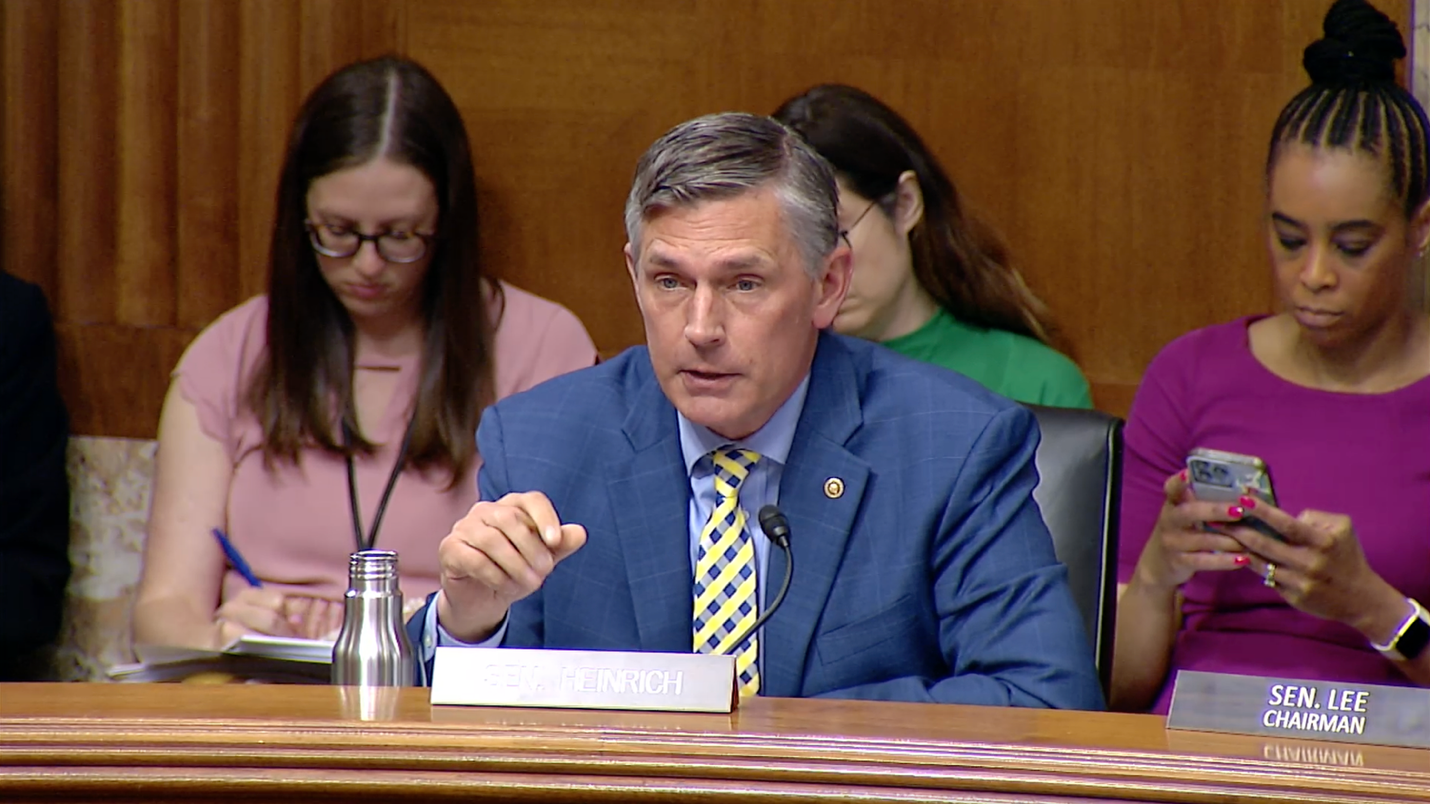VIDEO: Heinrich Questions Trump Administration Nominees on Protecting Public Lands, Upholding the Law, Ensuring Tribal Consultation
WASHINGTON — During a Senate Energy and Natural Resources Committee hearing, U.S. Senator Martin Heinrich (D-N.M.), Ranking Member of the Committee, questioned Trump Administration nominees on upholding the law, protecting public lands from large scale sales, and ensuring Tribal nations are consulted during the permitting process. The nominees considered by the Committee today include Mr. Tristan Abbey for Energy Department Administrator of the Energy Information Agency, Ms. Leslie Beyer for Interior Department Assistant Secretary for Lands and Mineral Management, Mr. Theodore J. Garrish for Energy Department Assistant Secretary for Nuclear Energy, and Dr. Andrea Travnicek for Interior Department Assistant Secretary for Water and Science.
During his opening remarks, Heinrich sought commitments from the nominees to follow the law as enacted by Congress and support and defend — rather than demolish — the offices and programs entrusted to their oversight, especially amid unprecedented attacks on career federal workers.

Heinrich began his line of questioning by asking Leslie Beyer, nominee for Interior Department Assistant Secretary for Lands and Mineral Management, about her support of divesting from public lands, “As Assistant Secretary you will oversee management of more than 245 million acres of public land. This land belongs to all Americans— including every single one of my constituents. Americans highly value their ability to access these lands for hunting, fishing, and other recreational uses. Do you support the large-scale divestment of our public lands?”
Ms. Beyer avoided directly answering whether or not she supports public lands divestment, “Sir, only Congress has the ability to dispose of any public lands. But I believe that our public lands have multiple use mandates, and they can be used for energy production, recreation, any number of other uses, for the benefit of all Americans.”
Heinrich turned to Dr. Andrea Travnicek to clarify the Trump Administration’s intentions with recent actions decreasing the timeline of National Environmental Policy Act (NEPA) reviews, which will inevitably harm meaningful consultations with Tribal nations, “Dr. Travnicek, you’ve been on staff for several months now and I appreciate many of our conversations, but [your role] gives you specific insights in the decisions that have already been made in the Department. The new guidance for NEPA projects that the Secretary announced for energy projects does not make any mention of Tribal consultation. However, it requires all reviews to be done within 14-28 days. I have personally never seen meaningful Tribal consultation completed in that time frame. My question is: Is the Administration proposing to eliminate Tribal consultation for these projects?”
Dr. Travnicek responded, “Thank you Senator Heinrich and I appreciate the conversations that we have had already. So, we know that there’s been a lot of conversations for a long tome related to trying to streamline the permitting processes, right? I think we’ve all been frustrated by that. We’ve seen some of these discussions here within this Committee as well. So, we are really just trying to figure out how we can move forward while still meeting the different requirements as well. We know that the Endangered Species Act (ESA) was mentioned in there, and the National Historic Preservation Act (NHPA). Also, we know that we will have to engage with Tribes. So, at the same time, how do we get permits out the door, get the infrastructure in place, develop the resources we need? So, it’s going to be trying to work on all the above, working with ESA, NHPA, and also engaging with the Tribes.”
Heinrich pushed back, “As someone who strongly supported permitting reform, and a majority of members on this Committee did— I think we largely support getting to yes or no faster. I really want to urge you to make sure that the Tribal consultation process is not a ‘check the box’ exercise, and that it is meaningful.”
Heinrich returned to questioning Beyer to address arbitrary stop work orders on permitted projects and the job losses it is creating, “Let me quote back something that you said a few minutes ago: ‘If our companies can’t get permits, we will be behind.’ I agree with that sentiment. Two weeks ago, Secretary Burgum sent a letter to the Acting Director of OEM, the Bureau of Ocean Energy Management, ordering an unprecedented stop work order to Equinor’s empire wind project off the coast of New York. That’s a fully permitted project. It has undergone rigorous review. It’s already under construction. And it would power half a million homes. Cancelling this project is a job killer for the skilled trades. And my concern is that it will squash any faith that the private sector has in the federal permitting process. If we do this to one project of one energy type, you can do it to another of a different energy type. So, if fully permitted projects are subjected to arbitrary stop work orders, how can we expect the private sector to commit capital to permit those large, expensive projects?”
Beyer replied, “Senator, thank you for that question. As you know, I have not been confirmed so I did not participate in that decision making-”
Heinrich redirected her answer, “Speak to the larger issue. Not to the specificity of that issue.”
Beyer answered, “Right. We need all forms of energy that we can get our hands on. There is a premium to secure, reliable, and affordable energy. I’m from Texas; we have a lot of wind energy there. I appreciate that it’s additive. But there is a premium to secure, affordable, and reliable energy that is not weather dependent in my view. And I will adhere to the guidance of the Secretary if I am confirmed.”
Heinrich clarified her answer, “In your view, should permitting be transparent and predictable?”
Beyer responded, “Yes sir.”
Heinrich wrapped his questions, “Thank you.”
###